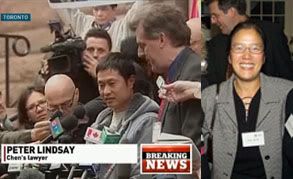 |
Left: Peter Lindsay at Chen's press conference
Right: The photo is a 2005 shot of a Chi-Kun Shi
at the University of Toronto's Faculty of Law
1984 alumni class reunion.
The man in the background of Shi's photo
resembles (greatly) Peter Lindsay.
----------------------------------------------------------------------------------------
Every time I do a close scrutiny of Chinese in the West (Canada and the United States), I find a glitch. Often, it is their subtle, but hardly camouflaged, support for all things Chinese that I find troublesome. This means support for Chinese ethnicity in its broadest sense. There's nothing wrong with supporting your ethnicity, but the Chinese are getting bolder with this, whether it is to gain ethnic sympathy (as in: if you don't agree with us you're racist), or to subtly enter Canadian social, cultural and political spheres only to promote their ethnicity.
The answer I have for this is if the Chinese (first, second, third, tenth generation, or "new" immigrants) are unhappy with the unchineseness of Canada, then they have the real thing to return to: China.
My Canadian co-blogger at Small Dead Animals writes effusively about a Chinese- "Canadian" lawyer, Chi-Kun Shi, who is entering politics. Since my suspicion about the Chinese (in their various hyphenated or unhyphenated identities) will not abate, I did some digging about this possible political candidate, who is running as a "conservative."
Chi-Kun Shi and her husband, white Canadian lawyer Peter Lindsay, worked together to defend holocaust denier Ernst Zundel several years ago. Lindsay's whiteness is significant, since the white liberal male is abandoning his own womenfolk and tying knots with Chinese women at unprecedented levels, at least here in Toronto. As I've written above, Chinese men and women, of any generational residency, or immigration status, or mix, will identify with their "Chineseness" first and foremost. Even Chinese/white offspring lean towards their Chinese ancestry.
Zundel is a virulent anti-semite, who instigates Jew-haters such as White Nationalists that plan for the destruction of the Jews. He was deported from Canada to Germany in 2005 (he acquired refugee asylum in Canada after being deported from the U.S. in 2003). Once in Germany, he was imprisoned for five years, and only released in 2010.
Why defend Zundel at all? The simple argument is that everyone needs a defense lawyer. The longer answer is that if Canadian law is able to discredit this one person because he is "different," then lawyers are necessary to defend those others who also don't fit in to the mainstream Canadian society, like Chinese, black, Hispanic, etc. immigrants. In the pursuit of equality, people like Shi are actually crucifying themselves. Many of these groups, and especially anti-semite brutes like Zundel, have no love for other races.
Still, it is interesting to look at the profile of these defense lawyers that take on these kinds of toxic cases. And Shi doesn't disappoint.
In a National Post article from February 2011, Stephen Harper visited Toronto's Chinatown to meet with a Chinese shop owner who made a citizen's arrest a couple of years ago. Shi is the lawyer defending this shop owner.
According to the Post, Harper's government is amending a bill to allow for citizen's arrests:
The owner or a person in lawful possession of property … may arrest a person without a warrant if they find them committing a criminal offence on or in relation to that property and (a) they make the arrest at that time or (b) they make the arrest within a reasonable time after the offence is committed and they believe on reasonable grounds that it is not feasible in the circumstances for a peace officer to make the arrest.This, I think is a dubious and dangerous precedence. In the U.S. according to Wikipedia:
Each state, with the exception of North Carolina, permits citizen arrests if the commission of a felony is witnessed by the arresting citizen, or when a citizen is asked to assist in the apprehension of a suspect by police. The application of state laws varies widely with respect to misdemeanors, breaches of the peace, and felonies not witnessed by the arresting party. For example, Arizona law allows a citizen's arrest if the arrestor has personally witnessed the offense occurring.Under "Legal and political aspect", this same Wikipedia article expounds:
American citizens do not carry the authority or enjoy the legal protections held by police officers, and are held to the principle of strict liability before the courts of civil- and criminal law including, but not limited to, any infringement of another's rights. Nonetheless many citizens' arrests are popular news stories.
Though North Carolina General Statutes have no provision for citizens' arrests, detention by private persons is permitted and applies to both private citizens and police officers outside their jurisdiction. Detention is permitted where probable cause exists that one has committed a felony, breach of peace, physical injury to another person, or theft or destruction of property. Detention is different from an arrest in that in a detention the detainee may not be transported without consent.
A person who makes a citizen's arrest could risk exposing him or herself to possible lawsuits or criminal charges (such as charges of impersonating police, false imprisonment, kidnapping, or wrongful arrest) if the wrong person is apprehended or a suspect's civil rights are violated. This is especially so when police forces are attempting to determine who an aggressor is.
The level of responsibility that a person performing a citizen's arrest may bear depends on the jurisdiction. For instance, in France and Germany, a person stopping a criminal from committing a crime, including crimes against belongings, is not criminally responsible as long as the means employed are in proportion to the threat (note, however, that at least in Germany, this results from a different legal norm, "aid to others in immediate danger," which is concerned with prevention, not prosecution, of crimes).The two quotes I've bolded above, the first from the National Post, and the second from Wikipedia, are significant in this case:
a. ...if the commission of a felony is witnessed by the arresting citizen...(National Post)
b. ...make the arrest within a reasonable time after the offence is committed...(Wikipeida)Chen made the citizen's arrest when the shoplifter supposedly returned to shoplift again. This assumes that Chen made the correct identification this second time around, and that he deduced correctly that this (possible original felon) was back again to commit the same crime, and not just to shop for fruits and vegetables. As the Wikipedia quote in the previous paragraph states, "Chen risk[ed] exposing him[self]...to possible lawsuits or criminal charges (such as charges of impersonating police, false imprisonment, kidnapping, or wrongful arrest) if the wrong person is apprehended or a suspect's civil rights are violated."
It is interesting that Canada is essentially taking on a radical approach in allowing individuals ("citizens") a larger role in policing their neighborhoods. Does this look like the infamous Nazi and Communist strategy of turning neighbors into vigilantes? Or, allowing "street" punishments to be meted out by civilians who intercept supposed perpetrators, or perpetrators-to-be?
Chen and his two aides tied up the shoplifter and locked him up in a delivery van until they got hold of a policeman. Chen was later charged with "kidnapping, carrying a dangerous weapon — a boxcutter — assault, and forcible confinement."
Setting aside the legal quagmire that Chen got involved in, he still cannot be denied a defense, although the prosecution's case is simple and clear. But what kind of defense lawyer would take on a case like this?
Shi comes to the rescue. But she doesn't simply do her lawyerly job, but has to add her own social commentary as well. From the National Post article above, Shi says:
"This is a bill that means a lot ot Chinese-Canadians because we are such a quiet lot,” she said. “It is one of the first times when Chinese-Canadians take a leading role in instituting social change.I don't see the new breed of Chinese-Canadians as "such a quiet lot." In fact, Shi is a testament to that vocal and increasingly belligerent group, which takes advantage of the multicultural ("we are Chinese [fill in your favorite ethnic group here]), and demand a non-discriminatory, privileged existence"). And making appeals to government to make "institutional social change" reeks of the hard-line governments that Shi's ancestors fled in looking for a free country to live in. This does not a conservative make. If they wish to regress to their pre-immigration years, Shi and her ilk should go back to China.
When will Canadians like the blogger at Small Dead Animals foster a healthy skepticism about "model" immigrants, and do the mundane task of unraveling what really lies behind these stories and individuals? I think it is a desperate attempt to find these model immigrants, in the name of multiculturalism, and Canada's favorite hobby of rendering equality to all, that drives such commentators.
On a side note, Shi and Lindsay are now divorced (according to this source). But, it is hardly surprising that with the panoply of weird cases they took on (a virulent anti-semite, pushing for dangerous citizen arrest bills, etc.), their marital environment got tainted. I think, too, that there are larger possibilities for discord in inter-racial marriages. And the demure Chinese woman is actually a myth (as Shi shows us), which, coupled with feminism and multicultural supremacy, makes white/Asian marriages more vulnerable to discord and break ups.













